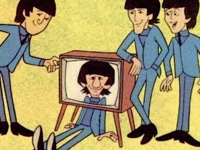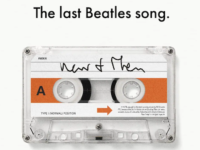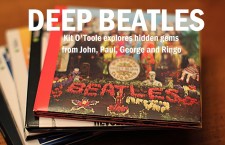Ringo Starr got off to a hot start in the post-Beatles years – establishing a run of eight Top 10 Billboard solo singles between 1971-75 that was highlighted by a pair of No. 1 smashes in “Photograph” and “You’re Sixteen.” His 1970 solo debut, Sentimental Journey, was a Top 10 hit in Starr’s native UK, while a pair of early ’70s albums in Ringo and Goodnight Vienna reached similar heights stateside.
Yet, somehow Ringo Starr’s solo career became largely forgotten along the way. To the point where Starr, born on July 7, 1940, became the last major figure involved with the Beatles to be separately recognized by the Rock and Roll Hall of Fame. (All three of his former bandmates, producer George Martin and manager Brian Epstein were also earlier honored.)
We could right that wrong with one more spin of the ageless “It Don’t Come Easy.” But, instead, we decided to dig a little deeper. Here are five recommended lesser-known tracks from the artist formerly known as Richard Starkey …
“LOSER’S LOUNGE” (BEAUCOUPS OF BLUES, 1970): In retrospect, this album didn’t quite come out of nowhere — despite its chilly reception by fans on both sides of the Atlantic. After all, Ringo Starr had already lent his voice to a number of country-tinged Fab numbers from “Honey Don’t” to “Don’t Pass Me By.”
There is a humor, and a pathos, to Starr’s singing that lends itself to country music, and that’s never more clear on his sophomore solo release than on “Loser’s Lounge,” a knee-slapping hoot that would have fit in perfectly during the Beatles folk period in 1965. In fact, a timely reissue of this album might fit right into any modern-day Americana radio format.
Still, as at ease as Ringo Starr sounds, so completely himself, that’s not the way things started out. Working with an all-star cast of Nashville sidemen — including Charlie Daniels, Dave Kirby, Pete Drake (who also served as producer), Ben Keith, D.J. Fontana and the Jordanaires — it took the former Beatle a moment to acclimate. That is until Drake, who’d met Starr when both contributed to George Harrison’s smash triple-album All Things Must Pass, piped up: “Hoss, if you don’t get loose, I’m gonna come in there and stomp on your toes.”
If “Loser’s Lounge” is any indication, Starr walked out of there with his toes in tact.
“HARRY’S SONG” (LIVERPOOL 8, 2008): This is, quite simply, everything you’d like a Ringo Starr song to be. That is, a Beatlesque track that’s not trying so hard. Dedicated to the mad genius that was Harry Nilsson, who died in 1994, Ringo loosens up in the tradition of Nilsson himself — a sometime musical collaborator/drinking partner with John Lennon.
In the same way Ringo once buttressed three of rock’s most important songwriters — and that is Starr’s true, largely underestimated legacy — he finds full flower during “Harry’s Song” in restating what made those old collaborations great, and greatly missed. It begins with the kind of bawdy guitar riff Lennon always loved, stumbles over an end table into this soaring vaudevillian chorus right out of the Paul McCartney playbook, gets lost for a moment in bouncy George-type psychedelia, then skips into a happy finish that nearly matches those lovably utopian lullabies associated with the Beatles’ middle period.
An inspired piece of reminiscence, this bit of sweet and folky pop is just right for Ringo. It doesn’t overstate its love of those previous successes, so much as it fondly recalls them. And Nilsson, who had this crazy knack for mixing Tin Pan Alley and 1970s’ Hollywood hedonism, I’m sure would have been thrilled by its sense of off-kilter joy.
“SHE’S ABOUT A MOVER” (OLD WAVE, 1983): This song is one of the few on the album that matches what the cheeky-at-the-time Old Wave title seemed to promise: It’s a rockabilly hoot. At first, anyway.
After a raucous couple of minutes, including a serrated guitar solo from producer, co-writer and future brother-in-law Joe Walsh, “She’s About a Mover” suddenly takes a truly stunning turn into a jazz second line — complete with a rumbling tuba — in place of the Sir Douglas Quintet’s fuzzy organ fills on the original. Always most at home as a vocalist inside such age-old forms, Ringo Starr sounds, at long last, like he’s having fun again after a long dark period following John Lennon’s awful murder.
He had actually moved into Lennon’s former home, which Starr had purchased from his Beatles buddy in the early 1970s, and did the bulk of recording for Old Wave in its converted studio. But he was, by this time, without a label and the album was issued piecemeal on different imprints worldwide. Old Wave would be Ringo’s last studio effort until 1992’s Time Takes Time.
“KING OF BROKEN HEARTS” (VERTICAL MAN, 1998): Ringo Starr has, since George Harrison’s death in 2002, written a number of loving tributes to his fallen friend — with 2003’s “Never Without You,” featuring Eric Clapton, proving to be a particular standout. Still, I’m not sure if this late-period collaboration doesn’t make the more emotional statement about the camaraderie this pair always had in the long shadows of their more famous bandmates.
Arriving just after Starr, McCartney and Harrison convened to complete a pair of lost Lennon tracks for the Anthology series, “King of Broken Hearts” found Starr returning with a unvarnished enthusiasm to the things we loved best about him with the Beatles. It sounds something like a collision between “Strawberry Fields Forever” and “Act Naturally.”
You have Harrison contributing a crying slide performance here, while producer Mark Hudson’s Beatle-inspired strings give “King of Broken Hearts” an anthemic swoon. Both might have engulfed a lesser performance by Ringo Starr, but instead he rises to the challenge — singing with a billowing sadness. It’s perhaps his finest performance.
“WALK WITH YOU” (Y-NOT, 2010): A rare duet with Paul McCartney, this track finds the friendly bravado of Ringo Starr’s best early records melting into a sadly appropriate melancholy — and not the put-on, aw-shucks kind so familiar from his youthful performances as a member of the Fab Four. Instead, “Walk With You” features perhaps the darkest, most mature chorus of any song he’s put out.
McCartney’s vocal works in counterpoint, taking the high road, while Starr intertwines beside and underneath. He had initially been invited to add the bass part for the sometimes perfunctory “Peace Dream” (a collaboration between Starr and legendary composer and arranger Van Dyke Parks), but was struck by “Walk With You.” Paul’s vocal — a quick breath behind Ringo’s, it’s like an echoing afterthought — recalls their fresh, offbeat Abbey Road constructions. Only there are these soft edges associated with age, and with loss.
Singing finally without the other half of the Beatles, McCartney and Starr tap into the deep well of emotion associated with those who fortunately and also, in a way, unfortunately remain. They are at once together, but alone.
- How Deep Cuts on ‘Music From Big Pink’ Underscore the Band’s Triumph - July 31, 2023
- How ‘Islands’ Signaled the Sad End of the Band’s Five-Man Edition - March 15, 2022
- The Band’s ‘Christmas Must Be Tonight’ Remains an Unjustly Overlooked Holiday Classic - December 25, 2016




